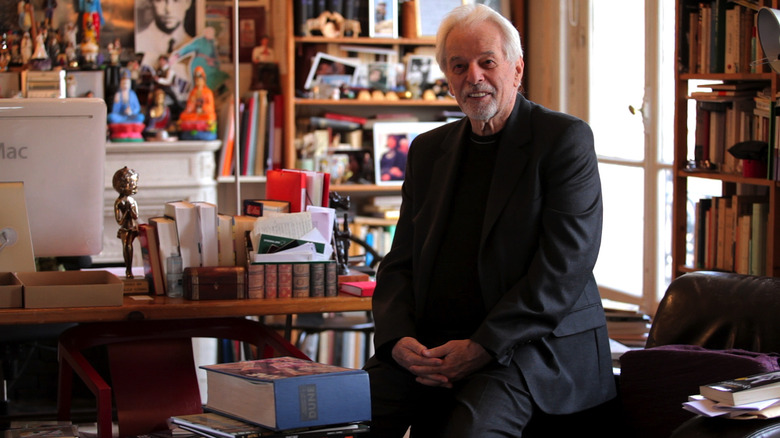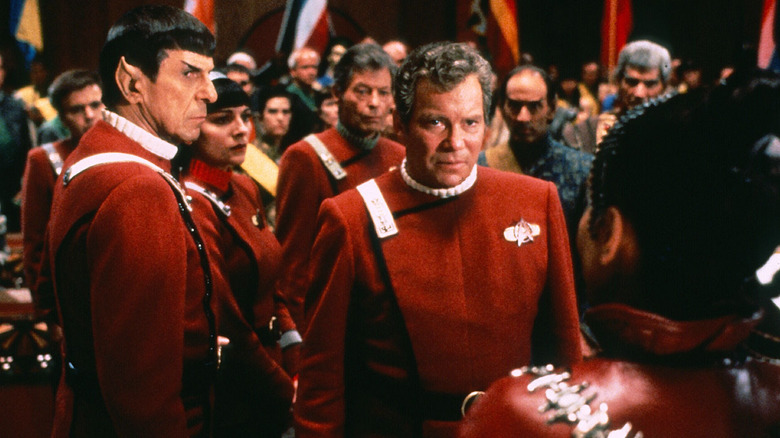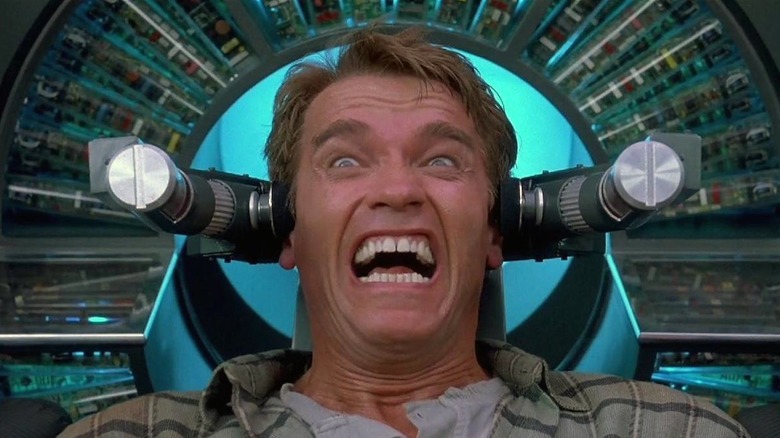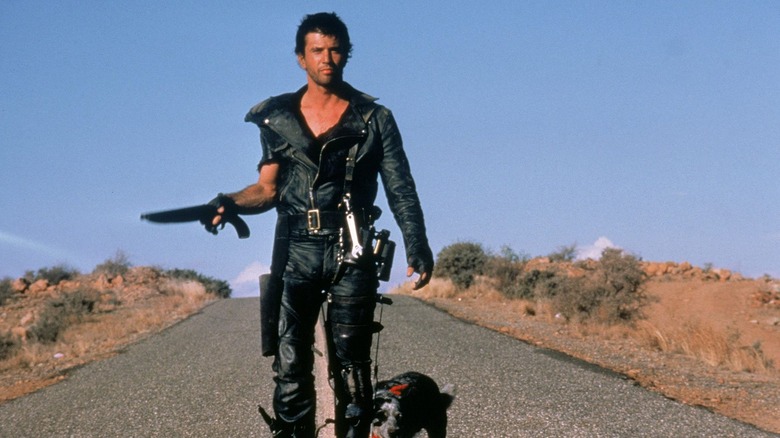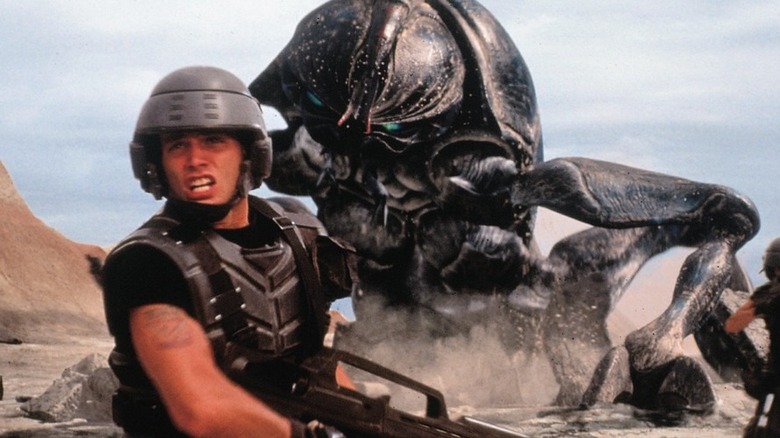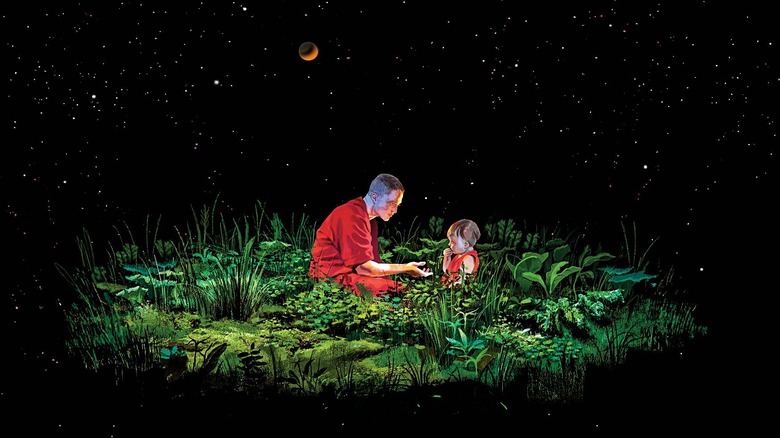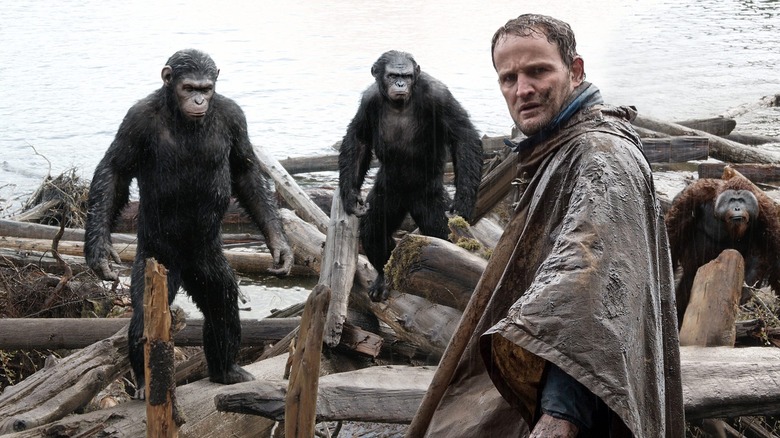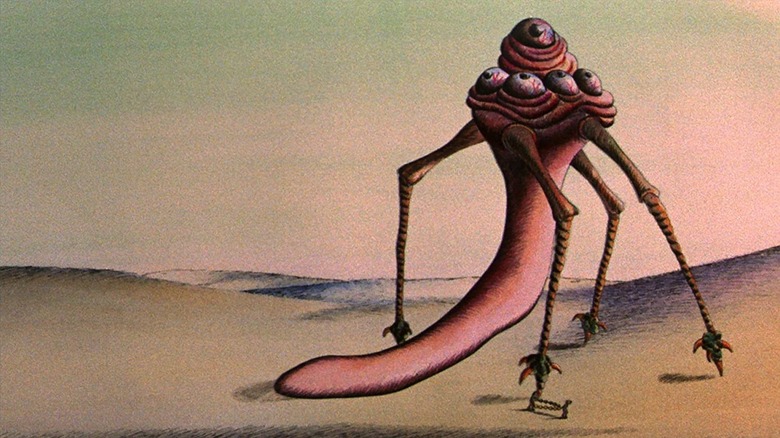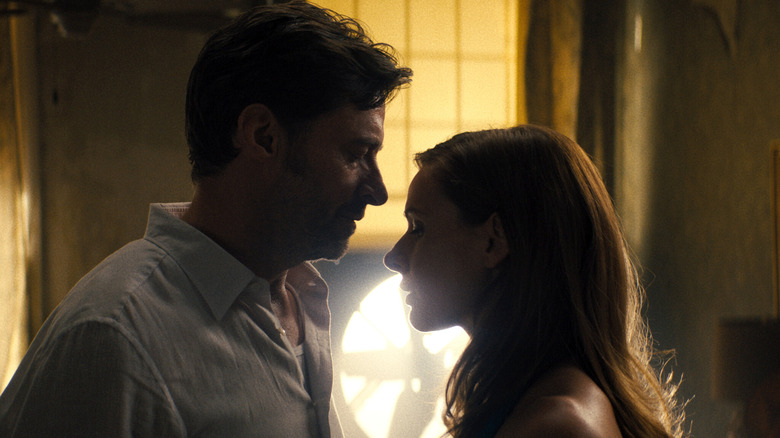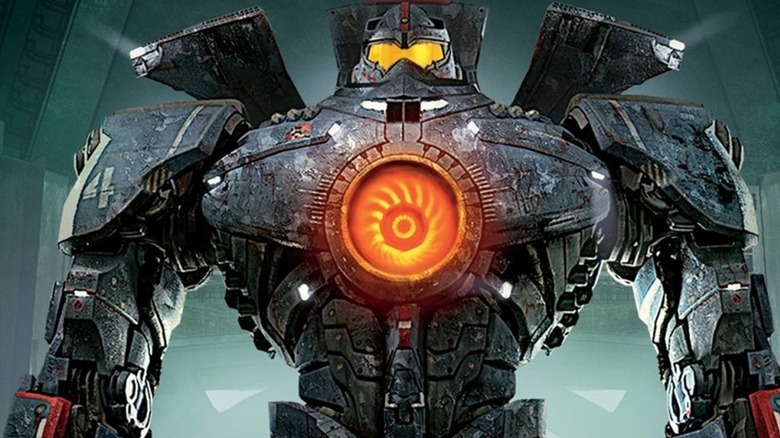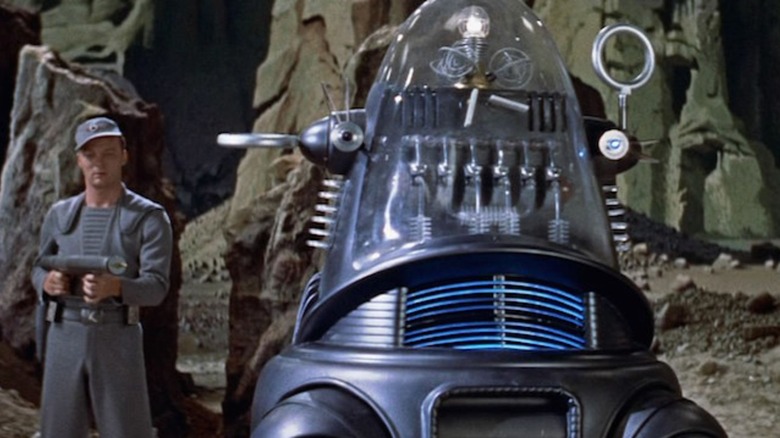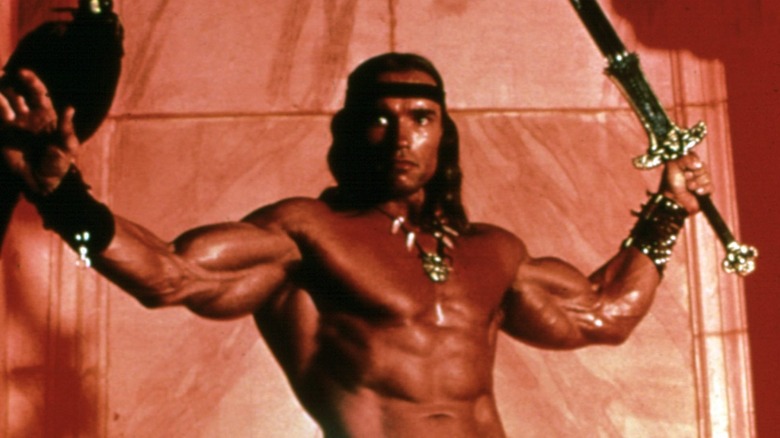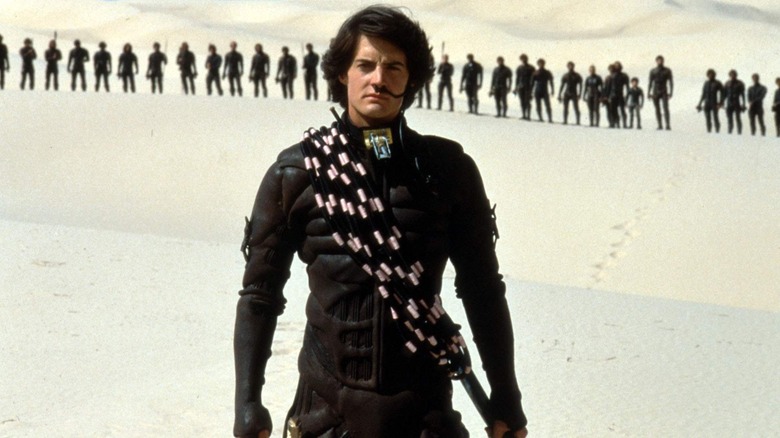Movies To Watch If You Loved Dune
Denis Villeneuve's reimagining of Frank Herbert's beloved sci-fi novel "Dune" is already cementing itself as a future classic within the genre. Villeneuve had already shown that he could take beloved sci-fi properties and reinvent them for a new generation with his masterful work on "Blade Runner 2049," and "Dune" boasts a similarly epic scale and intricate world building.
"Dune" takes place in a distant future where warring clans vie for precious resources. The young Paul (Timothee Chalamet) is poised to become the leader of House Atreides. His father Duke Leto Atreides (Oscar Isaac) leads the noble house in a conflict on the desert planet Arrakis, which has been torn apart by the warring Fremen and House Harkonnen clans. Paul possesses mystical powers inherited from his mother Lady Jessica (Rebecca Ferguson).
"Dune" combines the political intrigue of "Game of Thrones," the mix of sci-fi and fantasy of "Star Wars," and the unparalleled scale of "Lord of the Rings." If you loved "Dune," these films are worth watching.
Jodorowsky's Dune
Fans interested in learning about the history of the "Dune" franchise will certainly want to check out this insightful 2014 documentary. "Jodorowsky's Dune" explores Alejandro Jodorowsky's failed attempt to bring Herbert's book to life. The documentary, directed by Frank Pavich, details the meticulous craft and planning that went into a film that unfortunately never saw the light of day. Jodorowsky himself is an engaging presence, and it's interesting to ponder what sci-fi history would have looked like if his version was released. Jodorowsky's remark that if Lynch failed to make a good "Dune" movie then no one could is particularly humorous.
Jodorowsky is notorious for his eccentric films, which took familiar genres and transformed them into wild surrealist adventures. His early films "El Topo" and "The Holy Mountain" had gained popularity on the midnight screening circuit throughout the 1970s, gaining him high profile fans like John Lennon. In 1974, Jodorowsky grew interested in developing a sci-fi epic and optioned the rights to "Dune" from the production company Apjac International.
"Jodorowsky's Dune" features insights from those involved in the planned production. Jodorowsky's son Brontis would have starred as Paul Atreides, and future John Carpenter collaborator Dan O'Bannon had begun designing the film's extensive visual effects. Among the eclectic cast members associated with the project were Orson Welles, Mick Jagger, and Gloria Swanson. However, the ambition for what Jodorowsky saw as a 14 hour unprecedented experience only ballooned, and after nearly three years of development it was shelved.
Star Trek VI: The Undiscovered Country
In addition to being an expansive sci-fi epic, "Dune" is a political thriller set in space. Paul is forced to contend with the warring bureaucrats that vie for the interests of House Atreides. Although Leto promises that he will love his son regardless of the decisions he makes during his eventual political rule, Paul is burdened with responsibilities of representing an entire society at a young age.
"Star Trek" has always been a very political franchise, as the original series reflected a vision of the future that was forward thinking in the 1960s. Gene Rodenberry envisioned a society where all races, cultures, and religions could co-exist peacefully, but balancing all of these distinct political systems is undoubtedly a challenging task. The "Star Trek" shows frequently depict similar burdens and conflicts to the ones Paul is forced to deal with, and the 1991 film "Star Trek VI: The Undiscovered Country" is the most explicitly political cinematic entry within the series.
In a parallel to peace discussions between the United States and the Soviet Union that were ongoing when the film was released, the Federation negotiates a truce with the Klingon Empire that ends generations of conflict. Tensions escalate when the Klingon military leader Chang (Christopher Plummer) assassinates the Klingon Chancellor and frames Kirk (William Shatner) for the crime.
Total Recall
One of Paul's recurring inner conflicts in "Dune" is the haunting series of visions he receives of his own future. Paul inherits mind enhancing abilities from his mother's bloodline, but there are points in which he's unable to trust his own reality. He doesn't know how to interpret these visions, or what ramifications they will have.
Paul Verhoeven's 1990 sci-fi masterpiece "Total Recall" explores a similar concept of contorted reality. Douglas Quaid (Arnold Schwarzeneneggar) is a simple working class construction worker in a futuristic Earth society, and the prospects of living on Mars are only a pipe dream. However, Douglas receives visions of a mysterious woman who lures him to the Red Planet; in the dreams he is Carl Hauser, a secret agent who is caught within a conspiracy involving the immersive reality company Rekall and their control of participants.
Quaid is forced to question which version of events are true and, like "Dune," the intergalactic adventure boasts many great action sequences. Schwarzenenggar delivers one of his best performances, successfully playing both the mild-mannered Quaid and supremely confident Hauser.
Mad Max 2: The Road Warrior
The oppressive nature of the desert is a recurring theme within "Dune." The Fremen representatives warn Leto and the Atreides leaders that while they may have experience with intergalactic conflict, nothing can prepare them for the desolate nature of the natural environment. The second half of the film primarily focuses on the dangers Paul experiences within the hostile Arrakis desert; not only is he contending with a complex political strife, but he's fighting for the basic resources necessary for survival.
Nothing epitomizes desert-bound science fiction better than George Miller's "Mad Max" franchise. Miller's original 1979 "Mad Max" explored humanity's disintegration into chaos, but the 1981 sequel "Mad Max 2: The Road Warrior" is entirely contained to the post-apocalyptic Australian wasteland. Mel Gibson's titular character, a former cop who is haunted by his tragic past, is nearly wordless for the film's entire runtime. Like "Dune," resources are scarce, and Max contends with villains like Toecutter for water and supplies. Max is a more hardened character, but the young Feral Child he mentors possesses the same youthful innocence that makes Paul compelling, and is forced to adopt adult responsibilities quickly once he's thrust into violent circumstances.
Starship Troopers
"Dune" explores the reality of war in more intricate detail than most science fiction films. It's not as simple as just heroes and villains duking it out, and the efforts needed to mobilize an entire civilization into conflict are complex. Paul and the Atreides clan are also forced to deal with the moral questions that war entails. They must consider the ramifications of aligning with the Freman, and what the casualties to their military would look like in the wake of a large-scale assault.
Paul Verhoeven's 1997 film "Starship Troopers" is in no way a traditional futuristic military action thriller. Verhoeven took the more straightforward premise of Robert A. Heinlein's 1959 novel and used it to satirize militarization, and how "war makes fascists of us all." It's set within a future where the United Citizen Federation, the intergalactic government system, guarantees citizenship to all military veterans. The story follows earnest high school graduate Johnny Rico (Casper Van Dien) as he signs up for service and ascends to a leadership role. When the Federation declares war on the bug-like invaders that devastate Earth's surface, Johnny begins to shed his humanity as he becomes entrenched within the conflict.
"Starship Troopers" is a grim warning about the loss of idealism that paralleled the Vietnam era, but surprisingly the film's satirical intent was lost on some audience members during its initial release.
High Life
One of the most engaging elements of "Dune" is the intricacy of its world-building. He develops specific details of what space travel looks like, and spends time exploring the interior of the different vessels. Villeneuve captures these designs beautifully, and Paul pilots multiple spacecrafts and must quickly learn of their different abilities throughout his adventure.
Claire Denis's 2019 arthouse film "High Life" shows what daily life in space looks like, and meticulously details how the technology works. The film follows a group of criminals who are dispatched to deep space in an isolated vessel, bound for a mysterious destination at the center of a black hole. The crew of untrustworthy characters may question each other's motivations and break into brawls, but they're required to form some semblance of peace in order to not run out of air.
The story is told in a nonlinear fashion with surrealist flourishes characteristic of Denis's filmmaking, but focuses on Monte (Robert Pattinson) and his efforts to raise a young daughter Willow (Jessie Ross). Monte's anxieties about preserving his child's youthful experience amidst a hostile environment are shared by Leto and Jessica in "Dune."
Dawn of the Planet of the Apes
The shaky notion of peace is present throughout "Dune." House Atreides is aware that the Emperor's invitation to replace House Harkonnen is a trap, and that conflict is likely if they choose to align themselves with the Fremen. The Fremen themselves are far from trustworthy, and during an initial meeting the tribal leader Stilgar (Javier Bardem) is standoffish. Paul grows concerned about negotiating a deal with a culture that is inherently combative.
The "Planet of the Apes" franchise has frequently shown how intense these negotiations can be, and isolated societies of humans and apes are drawn into war throughout the course of the series. 2014's "Dawn of the Planet of the Apes" is set several years after humanity has been overrun by a virus, and a colony of humans makes contact with the tribe of apes led by Caesar (Andy Serkis). Caesar aims to resolve the situation peacefully, but the influential ape warrior Koba (Toby Kebbell) threatens to disrupt the talks with his plot of vengeance. Koba was tortured and enslaved during his captivity, and sees all of humanity as his enemy.
"Dawn of the Planet of the Apes" shows extremism on both sides. Malcolm (Jason Clarke) sees Caesar as a potential ally, and suggests that the two could work together to build a dam that would provide resources for both colonies. However, his rival Dreyfus (Gary Oldman) has been stung by his military experience, and like Koba threatens to initiate conflict.
Fantastic Planet
Loyal "Dune" fans will want to honor Villeneuve's wishes and seek out the film theatrically, as it boasts a stunning visual spectacle that merits the immersive nature of the big screen. Even for those who find the mythology to be overwhelming and the characters to be unengaging, it's hard to discount the breathtaking visuals from cinematographer Greig Fraser. "Dune" isn't only a thrilling action-adventure, but an artistic achievement.
The 1973 surrealist animated film "Fantastic Planet" is one of the most signature works of science fiction artistry ever created. Based on the 1957 novel "Oms en série" from Stefan Wul, it's dramatically different from "Dune." The dialogue is sparse, the tone is experimental, and the runtime is capped at a brief 71 minutes. However, sci-fi fans that love the genre for its unique aesthetics may find that both films offer compelling visualizations of intergalactic locals. "Fantastic Planet" tackles the same mature themes of intolerance, communication, and coexistence that "Dune" deals with.
Reminiscence
In addition to the meticulous world building, "Dune" has a compelling mystery at its center. House Atreides must investigate what the Emperor's schemes are, and Paul is caught between the warring influences of his parents. He knows the expectations that he will inherit from his father, but his mother's heritage as an acolyte of the Bene Gesserit mystical group gives him reason to question her allegiance. There is a constant aura of suspense, and Paul is haunted by mysterious dreams of the Fremen girl Chani (Zendaya).
2021's underrated original sci-fi thriller "Reminiscence" has a similar blend of sci-fi and mystery. It's a clear homage to sci-fi neo-noir classics like the "Blade Runner" universe to hich Villeneuve contributed. The film is set within the near future in Miami, where dramatic climate change has forced humans to live in perpetual darkness, and the government's strict police state is just as grim. Nick Bannister (Hugh Jackman) and his co-developer Watts Sanders (Thandie Newton) create innovative technology that allows participants to relive memories, and their clients have become hooked on nostalgia.
The lonely Nick sees a rare bright moment in his life when he falls for the nightclub performer Mae (Lady Jessica herself, Rebecca Ferguson), who is embroiled within a conspiracy involving a mysterious fortune. "Dune" has many romantic themes through Paul and Chani's relationship, and "Reminiscence" features terrific chemistry between Jackman and Ferguson. Even though they share only a few moments together in the beginning, Bannister's obsession is warranted.
Pacific Rim
Few filmmakers working today can effectively incorporate CGI without sacrificing the heart of their stories and characters, but Denis Villeneuve is one of them. Although renowned for his innovative narrative structures and frequent plot twists, Villeneuve is a visual genius who can create immersive spectacles. "Blade Runner 2049" and "Arrival" were both visually stunning, but "Dune" boasts his grandest scale yet. It showed Villeneuve's ability to craft epic action sequences, and the Attredies' escape from the sandworm and battle with the Emperor's disguised Sardaukar forces are massive.
Villeneuve's visual mastery is shared by the auteur Guillermo del Toro. Like Villeneuve, del Toro spent years perfecting his craft with smaller-scale projects before he helmed massive blockbusters. Although his action filmmaking skills were evident through his work on the superhero films "Blade II" and the "Hellboy" franchise, del Toro didn't create battle sequences on the level of "Dune" until his Kaiju monster film "Pacific Rim" in 2013.
In the near future, Kaiju creatures lying beneath Earth's surface are awoken and wreak havoc on civilization, forcing mankind to create superweapons to combat the unprecedented threat. They develop massive robotic Yaegars as large as the Kaijus, and the resulting duels are just as thrilling as the sandstorm battle of "Dune."
Forbidden Planet
Herbert's vision of outer space exploration within "Dune" is seen as one of the definitive science fiction texts, and explores what intergalactic travel could look like centuries into the future. Sci-fi is often prophetic. The notion of space travel has been present since the genre's earliest stages, and long before the Apollo 11 mission lunar visits could only be found in sci-fi stories. It's fascinating to look at early science fiction films to see what actual scientific advancements they foreshadowed, and the 1950s saw the debut of many classics within the genre.
While some of these films seem silly now, the classics that have stood the test of time introduced philosophical concepts that are still relevant. The 1956 film "Forbidden Planet" is an essential watch for any sci-fi fan. Inspired by William Shakespeare's play "The Tempest," the film follows the explorer Dr. Edward Morbius (Walter Pidgeon) as he leads a rescue mission to uncover a missing spaceship in the 23rd Century. "Forbidden Planet" was a landmark in many ways, as it was (according to the National Air and Space Museum) among the first films to depict lightspeed space travel. Robby the Robot was one of the first distinguishable robot characters in film, long before the Thinking Machines featured in "Dune."
Conan the Barbarian
Family drama amidst a state of war is one of the key themes of "Dune." Paul fears inheriting his destiny and failing to meet expectations, but knows he must do so in order to honor the legacy of his parents. As the story develops, Paul realizes he must seek vengeance for the crimes committed against his family. Although distinctly sci-fi, the imagining of political systems is reminiscent the medieval era.
Sword and sorcery films deal with similar concepts of destiny and family honor, and 1982's "Conan the Barbarian" is one of the definitive fantasy epics. Arnold Schwarzenegger delivered one of his breakout roles as the titular hero, an animalistic warrior who takes a leadership role in order to get revenge for his parents' death. The quest leads him to the fearsome snake warrior Thulsa Doom (James Earl Jones), a terrifying antagonist worthy of Baron Vladimir Harkonnen (Stellan Skargard).
Dune (1984)
Fans' skepticism about the new version of "Dune" largely stems from the tumultuous process behind the first attempt at adapting Herbert's novel. Many filmmakers attempted to gain the rights to the source material, but eventually David Lynch earned the job as writer and director. Lynch was an unusual choice to helm a massive sci-fi epic, as he was primarily known as the experimental genius behind "Eraserhead."
He was coming off of a successful awards season run for his emotional biopic "The Elephant Man," and was being courted by major studios to helm a blockbuster. Lynch even passed on the opportunity to direct "Return of the Jedi" before he signed on for "Dune." Unfortunately, Lynch was given little control over the film's creative direction, and was forced to significantly cut down his original vision. Lynch is known for his unique filmmaking style, which frequently features disorienting imagery and dreamlike sequences, but he was denied final cut privilege on "Dune."
The film was marketed as the next "Star Wars," but it was met with scathing reviews and bombed financially, crushing all prospects for a sequel. 1984's "Dune" is not perfect by any means, but it's still fascinating. Lynch got a fantastic performance out of breakthrough star Kyle Machlachlan in the role of Paul Atreides, and the two would go on to become frequent collaborators. The grimy visuals and terrific score by Toto make "Dune" enjoyable on a visceral level.

